Espressif Systems “ESP32-P4-Function-EV-Board” – the official ESP32-P4 development board – is now available in limited quantities on Espressif’s AliExpress store for $55.44, and some other AliExpress stores at a premium as part of a kit with a 7-inch touchscreen display and a 2MP camera module.
First unveiled in January 2023, the ESP32-P4 is the first general-purpose RISC-V microcontroller from Espressif Systems without any wireless connectivity. It’s a high-end microcontroller with two RISC-V cores clocked at 400 MHz, vector instructions for AI acceleration, a 2D graphics accelerator for smooth graphical user interfaces, and H.264 video encoding support. There’s been some buzz about it in recent months, and finally, it’s now possible to purchase an ESP32-P4 board for evaluation and software development.
ESP32-P4-Function-EV-Board development board specifications:
- Microcontroller – Espressif Systems ESP32-P4
- CPU
- Dual-core RISC-V HP (High-performance) CPU @ up to 400 MHz with AI instructions extension and single-precision FPU, 768KB of on-chip SRAM
- Single-RISC-V LP (Low-power) MCU core @ up to 40 MHz with 8KB of zero-wait TCM RAM
- Memory – 768 KB HP L2MEM, 32 KB LP SRAM, 8 KB TCM
- ROM – 128 KB HP ROM, 16 KB LP ROM
- GPU – 2D Pixel Processing Accelerator (PPA)
- VPU – H.264 and JPEG codecs support
- CPU
- Storage
- 16 MB SPI flash
- MicroSD card slot
- Display I/F – MIPI DSI connector compatible with an optional 7-inch capacitive touchscreen display with 1024 x 600 resolution
- Camera I/F – MIPI CSI connector compatible with an optional 2MP camera module
- Audio
- ES8311 audio codec
- 3W mono Class D audio power amplifier
- Built-in microphone
- Speaker output connector
- Networking
- 10/100M Ethernet via IP101GR Ethernet PHY chip
- Wireless – ESP32-C6-MINI-1 module for WiFi 6 and Bluetooth 5 connectivity; programming connector to update firmware (likely ESP-Hosted by default)
- USB – 1x USB 2.0 Type-A port, 1x USB 2.0 Type-C port
- Debugging – USB-UART Type-C connector for debugging through CP2102N USB to serial chip
- Expansion – 40-pin J1 GPIO header
- Misc
- Power Switch
- BOOT and Reset buttons
- 5V power LED
- 32.768 and 40 MHz Crystals
- Power Supply
- 5V via USB-C port
- 5V to 3.3V LDO
- TPS2051C USB power switch
- Dimensions – 82.5 x 74 mm
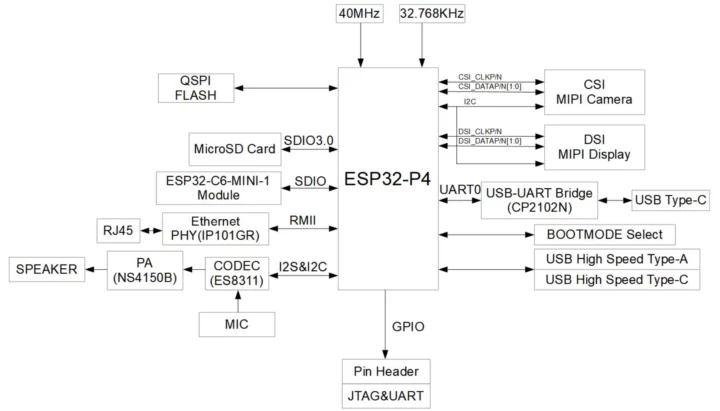
Some factory and LVGL code samples relying on the ESP-IDF framework can be found on GitHub, while documentation about the board is available directly on Espressif’s website.
The ESP32-P4-Function-EV-Board ships with a 7-inch capacitive touch screen with a resolution of 1024 x 600, a 2MP camera with MIPI CSI, and necessary cables and accessories.
Note the development board currently relies on engineering samples (V0.1) of the ESP32-P4 microcontroller with some limitations:
- The functionalities of USB Serial JTAG are not available, which will be supported in the future chip revision.
- The ADC on current samples is not calibrated, so the ADC calibration functionality is not available yet. The ADC will be calibrated on chips for mass production orders.
The ESP32-P4 board is suitable for prototyping visual doorbells, network cameras, smart home central control screens, LCD electronic price tags, two-wheel vehicle dashboards, and more.

Jean-Luc started CNX Software in 2010 as a part-time endeavor, before quitting his job as a software engineering manager, and starting to write daily news, and reviews full time later in 2011.
Support CNX Software! Donate via cryptocurrencies, become a Patron on Patreon, or purchase goods on Amazon or Aliexpress


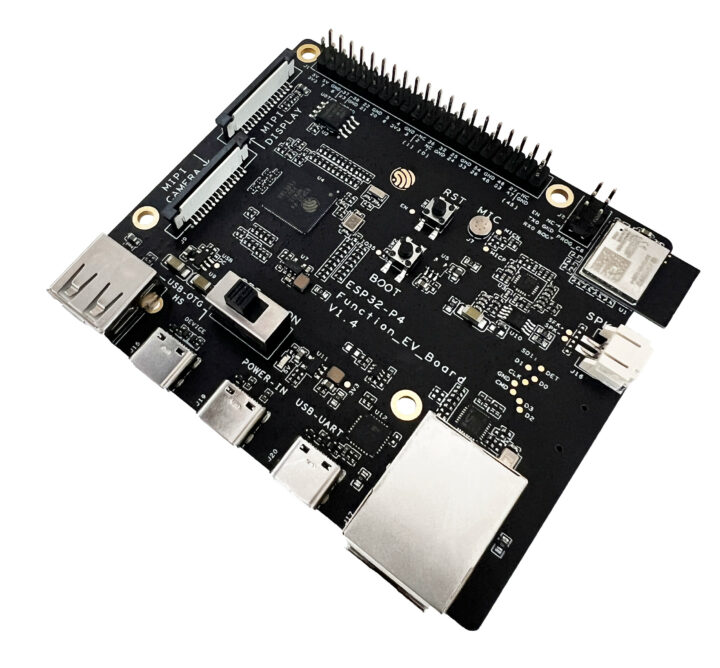
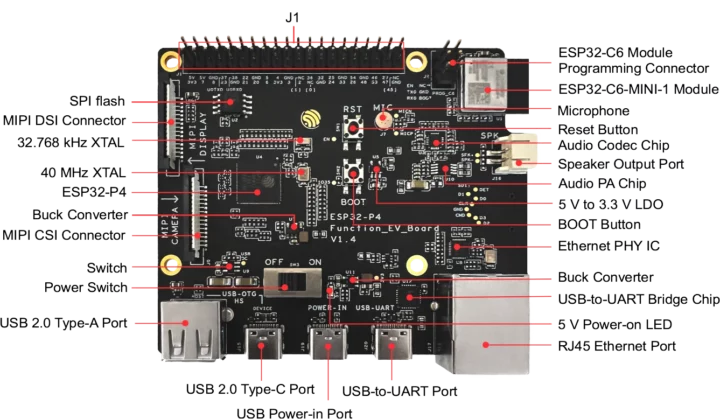
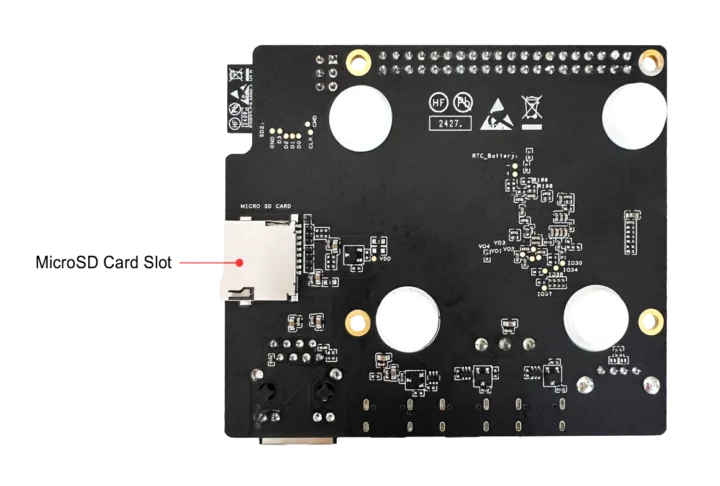
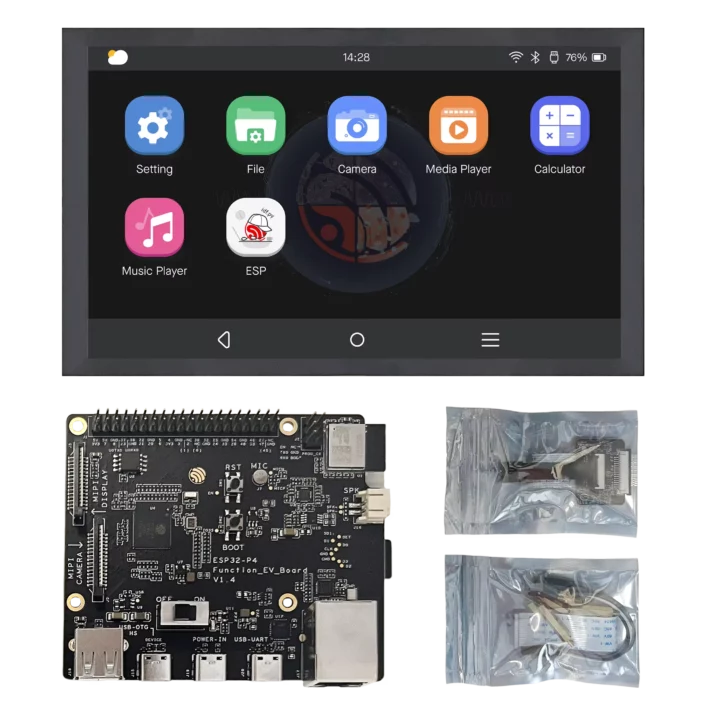



Can’t wait for release version
Same. This seems like a very good platform
It would be great if they made the exact same thing with just PoE added, that would make sense in a lot of scenarios IMHO.
Support for Zigbee and/or 802.15.4 would be a good idea in many of the target scenarios.
Interesting that the UI screenshot given looks a lot like Android when it most probably can’t run anything like it.
Hi Jacques
POE can be easily supported by adding a external adapter as this board is still a devkit…
The ESP32-C6 Wireless co-processor support 802.15.4 in a hardware side… But I think we’ll have to wait before having a “ESP-Hosted” with 802.15.4 driver interface…
Like this Matter solution?
https://docs.espressif.com/projects/esp-matter/en/latest/esp32/introduction.html#espressif-matter-solutions